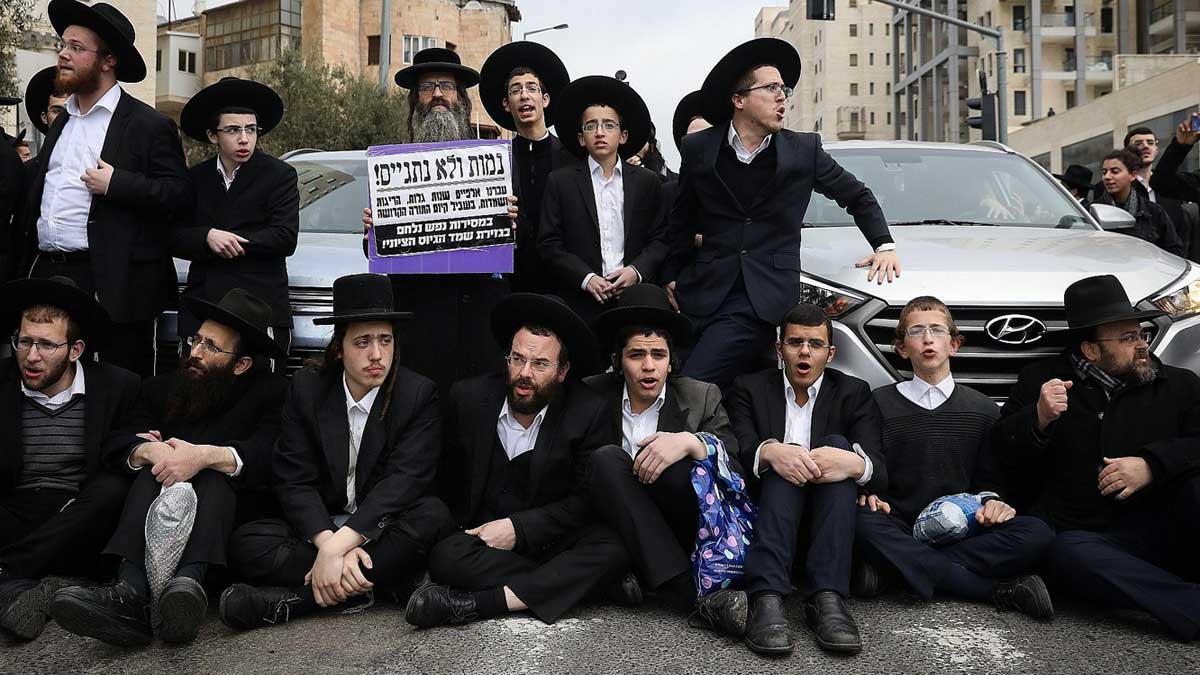- Home
- Billionaires
- Investing Newsletters
- 193CC 1000
- Article Layout 2
- Article Layout 3
- Article Layout 4
- Article Layout 5
- Article Layout 6
- Article Layout 7
- Article Layout 8
- Article Layout 9
- Article Layout 10
- Article Layout 11
- Article Layout 12
- Article Layout 13
- Article Layout 14
- Article Sidebar
- Post Format
- pages
- Archive Layouts
- Post Gallery
- Post Video Background
- Post Review
- Sponsored Post
- Leadership
- Business
- Money
- Small Business
- Innovation
- Shop
Recent Posts
Israeli Court Orders Ultra-Orthodox Draft, Threatens Coalition

The Israeli Supreme Court has mandated the inclusion of ultra-Orthodox Jewish seminary students in the country’s military draft, posing a significant political challenge to Prime Minister Benjamin Netanyahu. This decision directly impacts Netanyahu’s coalition government, which heavily depends on support from ultra-Orthodox parties.
In a unanimous decision, the court declared that there is no legal basis for the military service exemption traditionally granted to ultra-Orthodox Jewish seminary students. While military service is compulsory for most Israeli men and women, ultra-Orthodox Jews have historically been allowed exemptions to pursue religious studies. The ruling also requires the government to stop funding yeshivas or religious schools whose students do not comply with the draft orders. Netanyahu, his office, and Israeli Defense Minister Yoav Gallant have yet to respond to the court’s ruling.
The court’s decision is a severe blow to Netanyahu’s administration, which has supported the continuation of these exemptions. Implementing the draft could alienate key ultra-Orthodox coalition partners—Shas and United Torah Judaism—potentially leading to the collapse of his government. Despite Netanyahu’s preference to maintain the current exemptions, Defense Minister Gallant has advocated for ending them, emphasizing the urgent need for military personnel. Gallant’s stance resonates with a significant portion of the Israeli population, as a March poll revealed that 70% of Israeli Jews favor abolishing the exemptions.
Justice Uzi Vogelman highlighted the urgency of addressing inequality during ongoing conflicts, stating, “In the midst of a grueling war, the burden of inequality is harsher than ever and demands a solution.”
On the other hand, Moshe Gafni, a senior ultra-Orthodox lawmaker and leader of the United Torah Judaism party, condemned the ruling. He argued that the Supreme Court fails to recognize the value of Torah study and its historical contributions to Israel, saying, “There has never been a ruling by the Supreme Court in favor of the members of the Yeshiva and the interest of the ultra-Orthodox public.”
The ruling underscores the ongoing tensions between religious and secular segments of Israeli society. It challenges long-standing policies and could reshape the political landscape, testing Netanyahu’s ability to maintain his coalition. The outcome of this conflict will likely influence the broader debate on military service and religious exemptions in Israel.
Recent Posts
Categories
- 193cc Digital Assets2
- 5G1
- Aerospace & Defense46
- AI37
- Arts3
- Banking & Insurance11
- Big Data3
- Billionaires449
- Boats & Planes1
- Business328
- Careers13
- Cars & Bikes76
- CEO Network1
- CFO Network17
- CHRO Network1
- CIO Network1
- Cloud10
- CMO Network18
- Commercial Real Estate7
- Consultant1
- Consumer Tech180
- CxO1
- Cybersecurity68
- Dining1
- Diversity, Equity & Inclusion4
- Education7
- Energy8
- Enterprise Tech29
- Events11
- Fintech1
- Food & Drink2
- Franchises1
- Freelance1
- Future Of Work2
- Games141
- GIG1
- Healthcare78
- Hollywood & Entertainment186
- Houses1
- Innovation42
- Investing2
- Investing Newsletters4
- Leadership65
- Lifestyle11
- Manufacturing1
- Markets20
- Media193
- Mobile phone1
- Money13
- Personal Finance2
- Policy567
- Real Estate1
- Research6
- Retail1
- Retirement1
- Small Business1
- SportsMoney33
- Style & Beauty1
- Success Income1
- Taxes2
- Travel10
- Uncategorized8
- Vices1
- Watches & Jewelry2
- world's billionaires418
Related Articles
Trump Moves $4B Stake in Truth Social Parent, Stock Drops 6%
Donald Trump recently transferred his 57% stake in Trump Media & Technology...
By 193cc Agency CouncilDecember 20, 2024House Rejects Trump-Backed Funding Bill, Shutdown Looms
The U.S. House of Representatives rejected a new government funding bill on...
By 193cc Agency CouncilDecember 20, 2024Trump Named Time’s Person of the Year for Second Time
On Thursday, Time magazine honored Donald Trump as its “Person of the...
By 193cc Agency CouncilDecember 12, 2024Meta Donates $1 Million to Trump’s Inaugural Fund
Meta, the parent company of Facebook and Instagram, has confirmed a $1...
By 193cc Agency CouncilDecember 12, 2024














Leave a comment